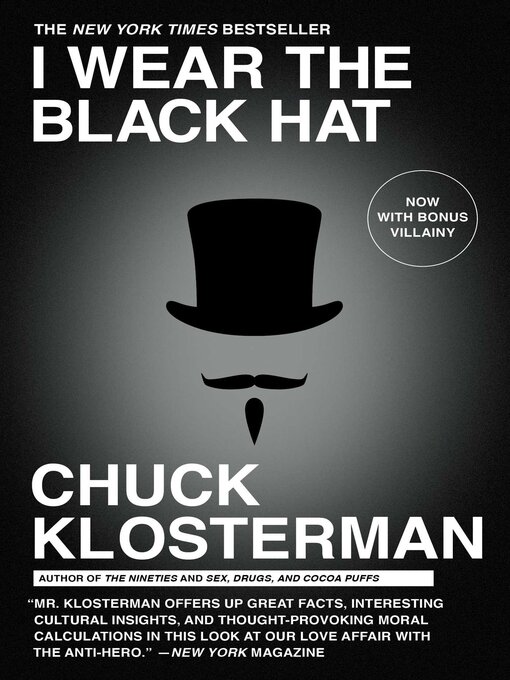Chuck Klosterman, "The Ethicist" for The New York Times Magazine, has walked into the darkness. In I Wear the Black Hat, he questions the modern understanding of villainy. When we classify someone as a bad person, what are we really saying, and why are we so obsessed with saying it? How does the culture of malevolence operate? What was so Machiavellian about Machiavelli? Why don't we see Bernhard Goetz the same way we see Batman? Who is more worthy of our vitriol—Bill Clinton or Don Henley? What was O.J. Simpson's second-worst decision? And why is Klosterman still haunted by some kid he knew for one week in 1985?
Masterfully blending cultural analysis with self-interrogation and imaginative hypotheticals, I Wear the Black Hat delivers perceptive observations on the complexity of the antihero (seemingly the only kind of hero America still creates). As the Los Angeles Times notes: "By underscoring the contradictory, often knee-jerk ways we encounter the heroes and villains of our culture, Klosterman illustrates the passionate but incomplete computations that have come to define American culture—and maybe even American morality." I Wear the Black Hat is a rare example of serious criticism that's instantly accessible and really, really funny.
-
Creators
-
Publisher
-
Awards
-
Release date
July 9, 2013 -
Formats
-
Kindle Book
-
OverDrive Read
- ISBN: 9781439184516
-
EPUB ebook
- ISBN: 9781439184516
- File size: 5172 KB
-
-
Languages
- English
-
Reviews
-
Publisher's Weekly
May 13, 2013
Klosterman’s latest exercise in pop-culture-infused philosophical acrobatics is an exploration of villainy, or rather, “the presentation of material” on the subject. Basically, the premise gives the veteran author (Sex, Drugs, and Cocoa Puffs) and current “Ethicist” for the New York Times Magazine an excuse to tackle an array of subjects ranging from Machiavelli (whose biggest crime was turning “an autocratic template into entertainment”) to 1980s N.Y.C. subway vigilante Bernhard Goetz, who could have been a superhero if he had just kept his mouth shut. “Every forthcoming detail about his life—even the positive ones—made his actions on the subway seem too personal,” Klosterman writes. His circuitous arguments are occasionally self-indulgent and too reminiscent of David Foster Wallace, but the writing is always intellectually vigorous and entertaining. According to Klosterman, being the villain is about knowing the most but caring the least, which has as much to do with self-awareness and public perception as the act itself. Agent: Daniel Greenbert, Levine Greenberg Agency. -
Library Journal
February 1, 2013
What, the "Ethicist" for the New York Times Magazine (and best-selling author of books like Sex, Drugs, and Cocoa Puffs) is proclaiming a fondness for the villain? Having once sided with Luke Skywalker, he now cheers Darth Vader's embrace of evil. Sharp but funny cultural criticism about where we draw the line between hero and villain--and the meaning of villainy in our society; with a six-city tour.
Copyright 2013 Library Journal, LLC Used with permission.
-
Formats
- Kindle Book
- OverDrive Read
- EPUB ebook
subjects
Languages
- English
Loading
Why is availability limited?
×Availability can change throughout the month based on the library's budget. You can still place a hold on the title, and your hold will be automatically filled as soon as the title is available again.
The Kindle Book format for this title is not supported on:
×Read-along ebook
×The OverDrive Read format of this ebook has professional narration that plays while you read in your browser. Learn more here.


